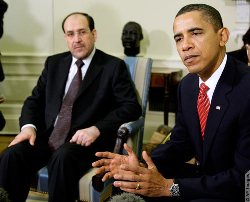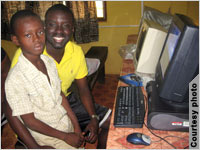President Obama calls the new Iraqi government a major step forward. The United States puts new pressure on those who are undermining democracy in Côte d’Ivoire. Not news: Twenty-five new U.S. citizens are sworn in. News: They are sworn in within sight of the U.S. Constitution. A new U.S. initiative is aimed at fighting world hunger through agriculture. A summit for U.S. and Russian class presidents is held in Russia. Finally, what would Lincoln tweet?
A New Government for Iraq
(mobile version)
The Council of Representatives swore in a new Iraqi government led by Prime Minister Nouri al-Maliki on December 21 in Baghdad after approximately nine months of debate. President Obama, at right with al-Maliki, calls the new government, “a significant moment in Iraq’s history and a major step forward in advancing national unity.”
New U.S. Response to Flawed Election Process in Côte d’Ivoire
(mobile version)
The United States has imposed travel restrictions upon Côte d’Ivoire’s President Laurent Gbagbo, members of his regime and others who are undermining their country’s democratic process. The Obama administration continues to urge Gbagbo to step down in favor of president-elect Alassane Ouattara.
New Citizens and Old Documents
(mobile version)
Twenty-five new citizens of the United States were sworn in squarely in front of the nation’s founding documents — the Declaration of Independence, the Constitution and the Bill of Rights. The new citizens were joined by friends and family members at a ceremony in the rotunda of the National Archives building.
Fighting World Hunger
(mobile version)
Fighting world hunger is at the heart of the U.S. Agency for International Development’s new Feed-the-Future global initiative, which was implemented in May to further a pledge made by President Obama of $3.5 billion toward agricultural development. The program helps nations produce more higher-quality food and improve targeting the right food to the very young and to pregnant women, says Dr. Rajiv Shah, the administrator of USAID.
A Gathering of U.S., Russian Student Leaders
(mobile version)
Student body presidents representing U.S. colleges and universities across the United States went to Russia in November to meet their counterparts in what many officials and academics hope will be the first of many such exchanges in coming years. It was the first program under the auspices of the U.S.-Russia Bilateral Presidential Commission’s Education, Culture and Sports Working Group.
 The American Civil War, Online
The American Civil War, Online
(mobile version)
News aggregators, blogs and social media outlets like Twitter are providing a new way to experience the 1861-1865 American Civil War in “real time” as the conflict has its 150-year anniversary. Online resources allow access to richer information sources and invite everyone to be a participant.





